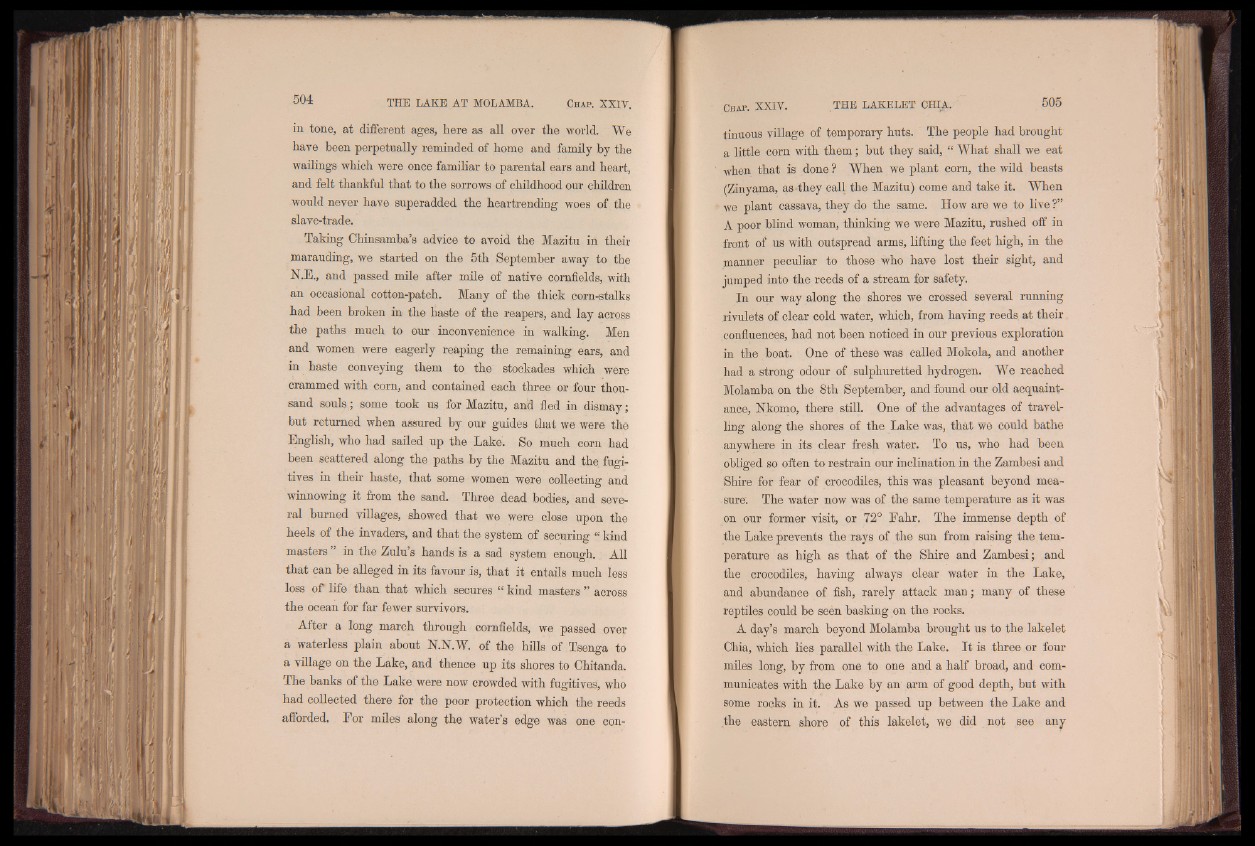
in tone, at different ages, here as all over the world. We
have been perpetually reminded of home and family by the
wailings which were once familiar to parental ears and heart,
and felt thankful that to the sorrows of childhood our children
would never have superadded the heartrending woes of the
slave-trade.
Taking Chinsamba’s advice to avoid the Mazitu in their
marauding, we started on the 5th September away to the
N.E., and passed mile after mile of native cornfields, with
an occasional cotton-patch. Many of the thick corn-stalks
had been broken in the haste of the reapers, and lay across
the paths much to our inconvenience in walking. Men
and women were eagerly reaping the remaining ears, and
in haste conveying them to the stockades which were
crammed with corn, and contained each three or four thousand
souls; some took us for Mazitu, and fled in dismay;
but returned when assured by our guides that we were the
English, who had sailed up the Lake. So much corn had
been scattered along the paths by the Mazitu and the fugitives
in their haste, that some women were collecting and
winnowing it from the sand. Three dead bodies, and several
burned villages, showed that we were close upon the
heels of the invaders, and that the system of securing “ kind
masters in the Zulu’s hands is a sad system enough. All
that can be alleged in its favour is, that it entails much less
loss of life than that which secures “ kind masters ” across
the ocean for far fewer survivors.
After a long march through cornfields, we passed over
a waterless plain about N.N.W. of the hills of Tsenga to
a village on the Lake, and thence up its shores to Chitanda.
The banks of the Lake were now crowded with fugitives, who
had collected there for the poor protection which the reeds
afforded. Eor miles along the water’s edge was one continuous
village of temporary huts. The people had brought
a little corn with them; but they said, “ What shall we eat
when that is done ? When we plant corn, the wild beasts
(Zinyama, as they call the Mazitu) come and take it. When
we plant cassava, they do the same. How are we to live?”
A poor blind woman, thinking we were Mazitu, rushed off in
front of us with outspread arms, lifting the feet high, in the
manner peculiar to those who have lost their sight, and
jumped into the reeds of a stream for safety.
In our way along the shores we crossed several running
.rivulets of clear cold water, which, from having reeds at their
confluences, had not been noticed in our previous exploration
in the boat. One of these was called Mokola, and another
had a strong odour of sulphuretted hydrogen. We reached
Molamba on the 8th September, and found our old acquaintance,
Nkomo, there still. One of the advantages of travelling
along the shores of the Lake was, that we could bathe
anywhere in its clear fresh water. To us, who had been
obliged so often to restrain our inclination in the Zambesi and.
Shire for fear of crocodiles, this was pleasant beyond measure'.
The water now was of the same temperature as it was
on our former visit, or 72° Fahr. The immense depth of
the Lake prevents the rays of the sun from raising the temperature
as high as that of the Shire and Zambesi; and
the crocodiles, having always clear water in the Lake,
and abundance of fish, rarely attack man; many of these
reptiles could be seen basking on the rocks.
A day’s march beyond Molamba brought us to the lakelet
Chia, which lies parallel with the Lake. I t is three or four
miles long, by from one to one and a half broad, and communicates
with the Lake by an aim. of good depth, but with
some rocks in it. As we passed up between the Lake and
the eastern shore of this lakelet, we did not see any